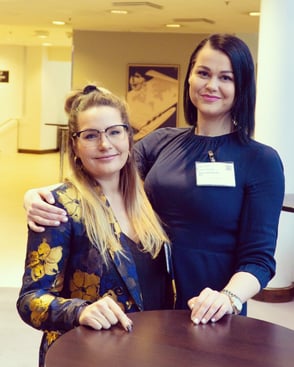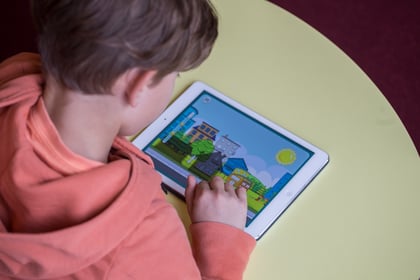
Ella Peltola and Martina Hamberg studied early childhood educators' attitudes towards Moomin Language School in their master's thesis.
We are Ella and Martina. We became friends during our studies in early childhood education at the University of Turku’s Department of Teacher Education in Rauma. We got our bachelor’s degrees in spring 2015 and continued our studies at the University of Tampere where we specialized in governance and politics in education.
In spring 2016 we came upon a chance to work with Playvation Ltd., a company producing digital learning content in interesting topics. Early language learning combined with digitalization proved to be an irresistible and fantastically innovative topic, and thus we began our research into Moomin Language School. We believed that the process would be a rewarding experience for both of us, and we weren’t disappointed.
The importance of attitude
In spring 2018, we finished our master’s thesis titled The importance of attitude – Early childhood educators and digital learning environments. As the title suggests, the thesis looks at early childhood educators and their attitudes towards a digital language learning environment, namely, Moomin Language School.
Early childhood educators regarded both digitalization and early language learning primarily in a positive light. They saw the Moomin Language School learning environment as a socially relevant phenomenon and as a useful tool which helps children gain the skills and courage to become active citizens in today’s world.
According to the study, the children’s courage to use the foreign language increased and their vocabulary grew when they used Moomin Language School. Educators emphasized the importance of children’s free will in using the learning application and the notion of learning through play. Both points were easily accomplished with the flexible use of the learning application. One factor which the educators felt was quite inspiring for the children were the Moomin characters.

The interviewed early childhood educators were open about their experiences with Moomin Language School. It was very interesting to hear about the challenges and opportunities in using the learning application. According to the early childhood professionals, challenges with Moomin Language School were mostly related to external factors such as the lack of tablets, poor network connections or the hectic nature of everyday life in early education organizations.
Early childhood educators saw the usefulness of technology education but the actual tools for utilizing digital learning environments were deemed inadequate which was seen as increasing the educators’ workload. Despite this, the educators emphasized the value and benefit of technology education for children’s learning, which tells us much about the educators’ professionalism.
In early childhood education, the staff turnover is often high. For this reason, the interviewed educators emphasized the importance of sharing the expertise and knowledge of using the Moomin Language School learning environment in the work community to ensure a consistent and long-term use of the application in the kindergarten. According to the early childhood educators, children were very enthusiastic about Moomin Language School and seeing their joy of learning motivated the educators even more.

Digitalization is the new black
Working on the master’s thesis was quite a rewarding experience for us as students - we learned a lot and got many innovative ideas for the future. Interestingly enough, there were no courses available on digital tools or technology education during our bachelor’s degree studies, nor was there enough discussion regarding the digitalization of early childhood education in general. Can we really assume educators to be able to use technological tools with children if these tools are foreign to educators themselves? Should the current early childhood education curriculum also be adapted to fit the current needs of early childhood education? We think it is extremely important that children have access to digital learning tools from an early age so that they can be used more easily when the children go to school.
Based on our research and the current social opinion, it can be said that Moomin Language School and similar digital learning environments have entered the field of early childhood education and are here to stay. We want to encourage all early childhood educators to think openly and to embrace both the opportunities and the challenges of digitalization in early childhood education like children would: with curiosity and open-minded wonder.


